Catching Up with Asphalt Green’s David Rodriguez
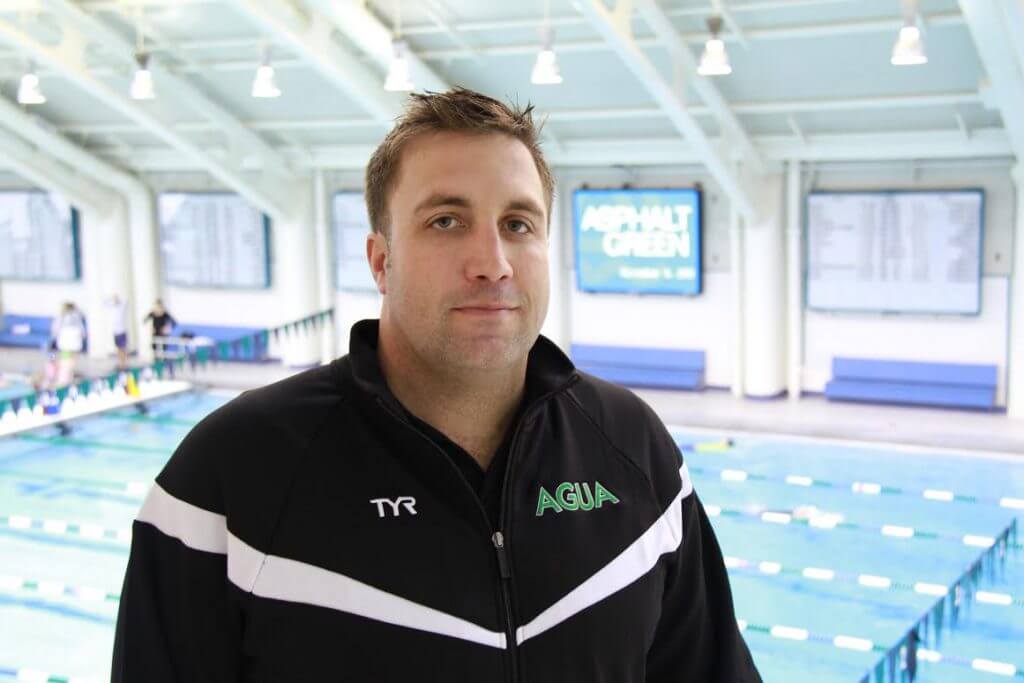
The Asphalt Green United Aquatics program—despite all the distractions of being located in one of the world’s most cosmopolitan cities—boasts the best age group program in New York City and one of the top swim programs in the country. AGUA is known primarily for the success of Lia Neal, who in addition to winning bronze medals at the 2012 and 2016 Olympics as a member of the U.S. 4×100-meter freestyle relay team had an outstanding collegiate career at Stanford.
Under the aegis of head Coach David Rodriguez, AGUA has continued to improve its standing in the world of youth swimming. Last year Rodriguez’s swimmers captured the program’s first-ever regional Junior Olympics title, snapping the Long Island Aquatic Club’s string of fifteen-straight titles.
A native of Miami who swam competitively for UNLV, Rodriguez recently spoke with Swimming World about the challenges of urban swimming programs, AGUA’s remarkable success and the bright future for age group swimming in New York City.
You went from working in the water as an athlete to working with athletes in the water.
I grew up swimming in Miami under coach Kirk Peppas. I was recruited to UNLV and swam there. We were multiple-time conference champs under Jim Reitz.
I didn’t anticipate going into coaching; my degree’s in finance. I graduated the same time as the recession of 2008 hit. I came home to Miami and my old coach at Metro Aquatic Club of Miami offered me a position as a stopgap to help him while he was looking for a new coach.
I ended up really enjoying the opportunity to interact with the kids, to really formulate them and create a value system that allows them to be successful long after they get out of the pool.
And that’s what we talk about here at Asphalt Green. Our core values are respect, accountability and discipline.
What is it that made you switch to coaching?
I had some success my first year and had that rush of my first athlete reaching a goal—even though it was pretty minimal: I think they made sectionals. But that moment for that kid was enormous, and that’s the experience that all us coaches work for. All the hard work, all the dedication, all the sacrifices that are made in our sport—so many times we fail but those times when our athletes do succeed—that’s what a lot of us are in it for.
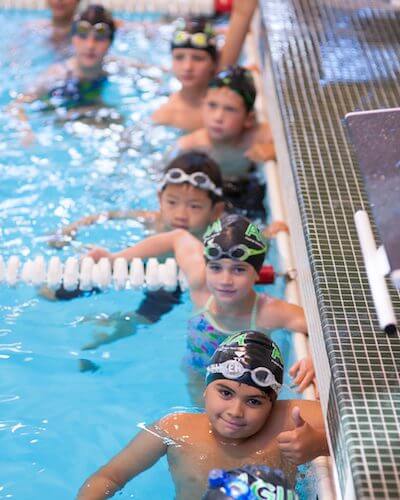
Photo Courtesy: POBY/Asphalt Green
At that point I was hooked. I was working another fulltime job and driving to go coach—my days started at 4 a.m. with morning practice and wouldn’t finis until 7:30 p.m. at night. That went on for about two years and then Pine Crest School under Jay Fitzgerald, which is a national powerhouse in swimming—I caught their eye. They were looking for head age group coach.
It was the first opportunity that I had to coach fulltime and not have to balance everything else.
As a Miami guy working with athletes in the bright Florida sun, what compelled you to come to New York City where year-round pool time is a precious commodity?
The true answer is: I did it for love. My wife Alana Berrocal—also a collegiate swimmer for Louisville—was going to law school up here. By happenstance there was an opportunity [at Asphalt Green] and the opportunity to be with her.
Asphalt Green is one of the best organizations I’ve ever worked for. When you come work for an organization like this—the infrastructure, the support, the fact that we’re here at a 50-meter pool in Manhattan—other teams don’t have that. All they want is to succeed.
And that culture of hard work, dedication and trying to be successful is built into these kids’ DNA. I originally took the job for love but when I became head coach—originally I was an age group coach and then was promoted after two years—and the reason that I’ll stay for a long time is the mission of the organization. As far as all the people we teach how to swim, and all the non-profit work that we do, that, along with our commitment to excellence in the sport is something that will keep me here for a long time.
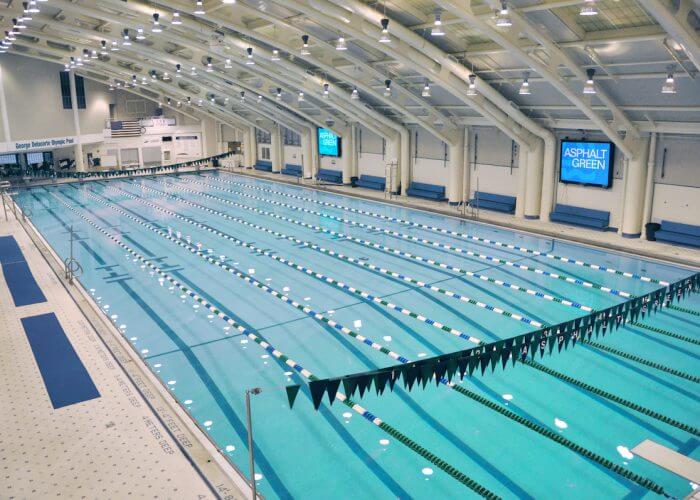
George Delacorte Pool. Photo Courtesy: Poby/Asphalt Green
How is that culture of excellence replicated through the entire swim program—from learn to swim to striving for Olympic qualification?
As the pinnacle program at Asphalt Green we take a big responsibility in being the culture setters for the program. Everything that we do—how we communicate to parents, how we teach a stroke—we’re passing that down to our swim school, learn to swim program, our youth soccer program.
We take a lot of pride in being the number one program in our organization. We also take a lot of pride in lifting the rest of the program up. So we spend a fair amount of time thinking: how can we get our other programs to do things at the level of our competitive swim program.
New Yorkers are famously impatient—and demand only the best for their children. How do you keep your athletes progressing while satisfying their parents’ desire for success?
If I could bottle that answer I wouldn’t have to work anymore! Every coach in America wants that.
You put your kids in sports, not for the Olympic gold medal. You put your kids in sports for them to grow, to understand those values that we put in front of them and how to overcome challenges. A swimmer at 14 will face more adversity in those times than most of their counterparts in school have to. In swimming you do everything your coach says, everything you’re supposed to do, and you wake up the day [of a big meet] with a stomach bug and you’ve just got to eat it and get right back to work the next day.
As we’re trying to instill these values in our kids we talk more about that than about how the product [of our efforts] is going to be elite swimming. You can’t come into our program being myopically focused on just that because you’re going to miss all that Asphalt Green has to offer.
We have 350 athletes—that’s 600+ parents. We’re going to have parents that fall on all sides of the spectrum but the majority of families have bought into what we’re about and how we go about doing things.
I’m the most competitive guy on the deck, but if it’s just about that then they’re losing a lot of what they can learn from this sport. So when we have parent education pieces we spend a fair amount of time educating [parents] from when their children are in entry-level groups—before they get that desire to put their kid on the Olympic podium—to understand what we’re about.
This city is not known known for swimming—which makes it that much harder for your kids to succeed. How does your program account for the particular obstacles to the sport in New York City?
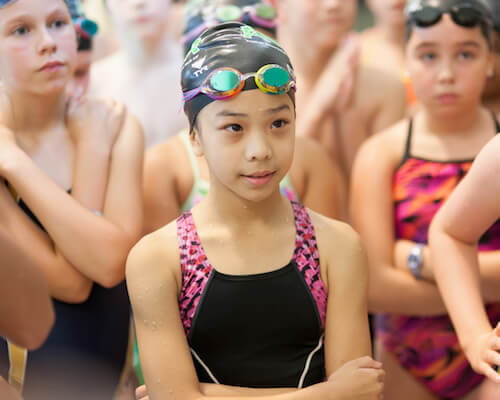
Photo Courtesy: POBY/Asphalt Green
I believe that it’s at the core of who we are. When we’re faced with something that’s not exactly how we planned, we’re adaptable.
We understand when there’s something in front of us, we’re not going to sit there and pout about it. We’re going to figure out a way to make it work.
We start practices at 5:30 p.m. When I was at Pine Crest we’d start at 4 p.m. We’ve had to find some creative ways to balance out the schedule to make that work. But our expectations for our athletes are the same as if I was back at Pine Crest. They made a commitment to our program, especially at the highest levels, and we expect them to be able to meet [those commitments].
That’s not always going to happen but the expectation is there.
We do an annual tryout that happens post-Labor Day. We turn away about 150 kids a year—whatever the talent pool is that year, they’re just not in the top 20% [of athletes] that we take. We always have that bottom level group that moves up so we always need to fill that.
Where does AGUA compare to its regional competitors and also how competitive is it on the national level?
Regionally, our girls just won sectionals for the second year in a row. The Long Island Aquatic Club is our big rival. Last year we ended their 15-year streak of winning JOs (Junior Olympics). We go toe-to-toe with them a lot. They’re a heck of a program so I would say that they’re 1 and we’re 1A in the region.
In a virtual club championship perspective we’re a top-40 team in the country.
When you first started here where would you say Asphalt Green ranked nationally?
We were averaging in the high 70s, low 80s as a program (nationally). Our desire is to be in the top-25 annually.
How will AGUA get to that goal?
There’s two parts to that question. Looking at it from a macro sense, the teams that we’re trying to catch that are in the top-25 are all 500+ member teams. For us, casting a wider net, influencing more of Manhattan, expanding how we go about recruiting swimmers, is important.
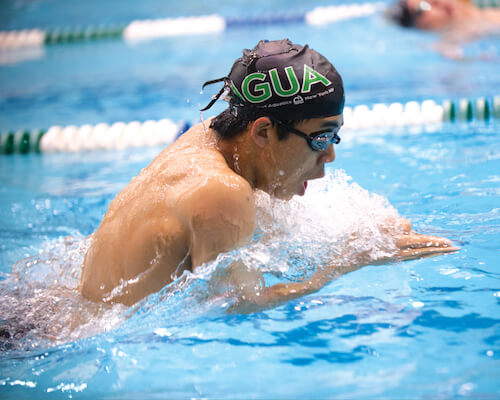
Photo Courtesy: POBY/Asphalt Green
On the day-to-day side, our pursuit is to get a little bit better each day. We’re very process oriented, looking to get a little better every day then looking back five years from now and saying: “Wow, look at what we’ve done.”
We look to instill that in our athletes, our parents, our administrators—everybody that’s associated with our program. I never promised to get us from fortieth to first in a month. But what I have said is that we need to get slowly but surely get better every day.
Our athletes will finish a lap and I’ll ask them: “What did you get better at?” We want them to be conscious of what they’re doing. We don’t waste laps. A lot of people are shifting away from the high volume of training to a more quality-based training. I would say we’re a hybrid of that. We take a little bit of what works from everybody and make it our own.
We have a young, hungry coaching staff that wants to climb the mountain every day. The same hunger and desire that we have is what we try to get our athletes to strive for.




Good job David, hard work always pays off.
Good job David, hard work always pays off